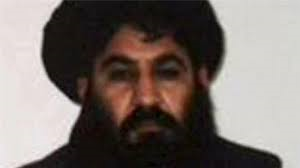
(Credit: Al Jazeera)
WASHINGTON, May 21 (Reuters) – The United States conducted a drone strike on Saturday against the leader of Afghan Taliban, likely killing him on the Pakistan side of the remote border region with Afghanistan in a mission authorized by U.S. President Barack Obama, officials said.
The death of Mullah Akhtar Mansour, should it be confirmed, could further fracture the Taliban – an outcome that experts cautioned might make the insurgents even less likely to participate in long-stalled peace efforts.
The mission, which included multiple drones, demonstrated a clear willingness by Obama to go after the Afghan Taliban leadership in Pakistan now that the insurgents control or contest more territory in Afghanistan than at any time since being ousted by a U.S.-led intervention in 2001.
Pentagon spokesman Peter Cook confirmed an air strike targeting Mansour in the Afghanistan-Pakistan border region but declined to speculate on his fate, although multiple U.S. officials, speaking on condition of anonymity, told Reuters he likely was killed.
“We are still assessing the results of the strike and will provide more information as it becomes available,” Cook said.
A Taliban commander close to Mansour, speaking to Reuters on condition of anonymity, denied Mansour was dead.
“We heard about these baseless reports but this not first time,” the commander said. “Just wanted to share with you my own information that Mullah Mansour has not been killed.”
In December, Mansour was reportedly wounded and possibly killed in a shootout at the house of another Taliban leader near Quetta in Pakistan.
Bruce Riedel, an Afghanistan expert at the Brookings Institution think-tank, described the U.S. operation in Pakistan as an unprecedented move but cautioned about possible fallout with Pakistan, where Taliban leadership has long been accused of having safe haven.
A State Department official said both Pakistan and Afghanistan were notified of the strike but did not disclose whether that notification was prior to it being carried out.
“The opportunity to conduct this operation to eliminate the threat that Mansour posed was a distinctive one and we acted on it,” the official said.
TROUBLED PEACE TALKS
The U.S. drones targeted Mansour and another combatant as the men rode in a vehicle in a remote area southwest of the town of Ahmad Wal, another U.S. official said, speaking on condition of anonymity.
U.S. special operations forces operated the drones in a mission authorized by Obama that took place at about 6 a.m. EDT (1000 GMT), the official said. That would have placed it at Saturday at 3 p.m. in Pakistan.
Cook branded Mansour “an obstacle to peace and reconciliation between the government of Afghanistan and the Taliban” and said he was involved in planning attacks that threatened U.S., Afghan and allied forces.
Michael Kugelman, a senior associate for South and Southeast Asia at the Woodrow Wilson Center, said the strike was unlikely to bring the Taliban to the negotiating table any time soon.
“The Taliban won’t simply meekly agree to talks and especially as this strike could worsen the fragmentation within the organization,” he said.
Kugelman said the most important target for the United States remained the top leadership of the Haqqani network, which is allied with the Taliban.
Mansour had failed to win over rival factions within the Taliban after formally assuming the helm last year after the Taliban admitted the group’s founding leader, Mullah Omar, had been dead for more than two years.
It was unclear who Mansour’s successor might be.
“If Mansour is dead it will provoke a crisis inside the Taliban,” Riedel said.
U.S. Senator John McCain, the Republican head of the Senate Armed Services Committee, said he hoped the strike would herald a change in the Obama administration’s policy against more broadly targeting the Taliban.
The new U.S. commander in Afghanistan is currently reviewing U.S. strategy, including whether broader powers are needed to target insurgents and whether to proceed with plans to reduce the number of U.S. forces.
“Our troops are in Afghanistan today for the same reason they deployed there in 2001 – to prevent Afghanistan from becoming a safe haven for global terrorists,” McCain said.
“The Taliban remains allied with these terrorists, including al-Qaeda and the Haqqani network, and it is the one force most able and willing to turn Afghanistan into a terrorist safe haven once again.”
(Additional reporting by James Mackenzie in Afghanistan and Drazen Jorgic in Pakistan; Editing by Bill Trott and David Gregorio)

